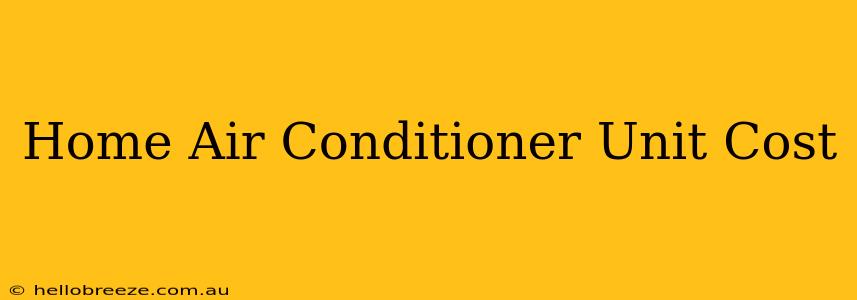Buying a new air conditioner can be a significant investment. Understanding the cost factors involved is crucial to making an informed decision. This guide breaks down the home air conditioner unit cost, exploring various influencing factors and helping you budget effectively.
Factors Affecting the Cost of a Home AC Unit
Several key factors influence the price of a home AC unit. Let's delve into the specifics:
1. Type of Air Conditioner
The type of AC unit you choose significantly impacts the overall cost. Here's a breakdown:
-
Central Air Conditioners: These systems are the most expensive upfront but offer superior cooling for entire homes. Expect a higher initial investment, but potential long-term savings through energy efficiency.
-
Window Air Conditioners: These are the most budget-friendly option, ideal for single rooms. They are relatively inexpensive to purchase and install.
-
Portable Air Conditioners: Offering flexibility, these units can be moved from room to room. They typically fall in the mid-range price point.
-
Ductless Mini-Split Systems: A popular choice for additions or zones within a home, these offer excellent efficiency but come with a higher price tag than window units.
2. SEER Rating and Energy Efficiency
The Seasonal Energy Efficiency Ratio (SEER) rating measures how efficiently an AC unit operates. Higher SEER ratings indicate greater energy efficiency, leading to lower electricity bills over the unit's lifespan. While higher SEER units have a higher initial cost, the long-term savings often outweigh the extra upfront expense. Consider a unit with a high SEER rating for better value and environmental responsibility.
3. Size and Capacity (BTUs)
The cooling capacity of an AC unit, measured in British Thermal Units (BTUs), needs to match your home's size and cooling needs. An undersized unit will struggle to cool your space effectively, while an oversized unit will cycle on and off frequently, leading to uneven cooling and increased wear and tear. Proper sizing is critical, so consult a professional for accurate assessment to avoid unnecessary costs and inefficiencies.
4. Installation Costs
Installation costs vary depending on your location, the complexity of the installation (particularly for central air systems), and the installer's rates. Expect to budget for professional installation, as improper installation can void warranties and lead to safety hazards. Always get multiple quotes from reputable installers.
5. Brand and Features
Different brands offer varying features and price points. Some brands are known for their premium features and higher prices, while others offer more budget-friendly options with basic functionalities. Consider your needs and prioritize features that matter most to you. Research different brands to compare features, warranties and reliability.
6. Additional Costs
Beyond the unit's price and installation, other costs may arise:
- Permits: Check your local building codes for permit requirements.
- Ductwork (for central AC): Existing ductwork might need modifications or replacements.
- Refrigerant: The cost of refrigerant can fluctuate.
- Maintenance and repairs: Factor in routine maintenance and potential repair costs over the unit's lifetime.
Estimating the Cost
The cost of a home air conditioner unit can range considerably. Here's a general estimate:
- Window units: $200 - $800
- Portable units: $300 - $1000
- Ductless mini-splits: $1500 - $6000+ (per unit)
- Central AC systems: $5000 - $15000+
These are rough estimates. It's crucial to obtain personalized quotes from local HVAC contractors to get an accurate estimate based on your specific needs and location.
Tips for Saving Money
- Shop around and compare prices: Obtain multiple quotes from different contractors and suppliers.
- Consider energy-efficient models: Although the upfront cost might be slightly higher, energy-efficient models will save you money on your electricity bills in the long run.
- Look for rebates and incentives: Many utility companies offer rebates for purchasing and installing energy-efficient air conditioners.
- Proper maintenance: Regular maintenance can extend the life of your AC unit and prevent costly repairs.
By carefully considering these factors and obtaining professional estimates, you can make an informed decision about your home air conditioner purchase and ensure you stay within your budget. Remember that investing in a high-quality, energy-efficient unit pays off in the long run through lower energy bills and increased comfort.

